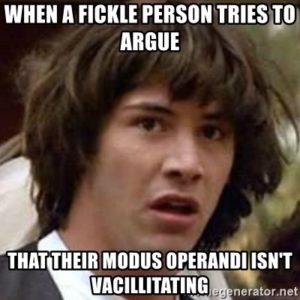Did your girlfriend tell you she knows your 'm.o' when you get ready to go to the bar with friends? This post unpacks the meaning and origin of this acronymic expression.
Meaning
The acronym 'm.o' stands for 'modus operandi.' A modus operandi is a Latin phrase describing a set of actions defining a person's behavior or habits.
Typically, you'll see 'modus operandi' used in TV shows surrounding police work and detectives solving cases. They'll use 'm.o' to describe the perp's behavior and guess the criminal's future actions.
Criminal psychologists use an 'm.o' to assist them in the process of criminal profiling, which can assist with providing insight into the criminal's past and future behavior. A modus operandi can assist in the identification or apprehension of a suspect and in determining links between their crimes.
A modus operandi is like a personal unique behavioral fingerprint, giving clues to their identity and character. In business, a modus operandi describes a firm's business model and how they execute their business strategy when interacting with the market and other firms.
Example Usage
"I know this guy's m.o, I've seen it before. We must pray that this isn't the start of a serial killing cycle. We have too many psychopaths on our hands at the moment."
"So, what's your m.o then? Are you one of those guys that tells a girl what she wants to hear and sails into the night after he gets what he wants?"
"That's his m.o girl. First, he gets you hooked on him and ready to do anything for him. Then he sticks them with the old line of needing immediate cash, and they fall for it."
"Why do you think his m.o is suspect? I mean, he comes home from school every day on time and always does his homework."
"Why aren't we building the case around the perp's m.o? Is there a reason why we haven't figured that out yet?
"What's the m.o of the serial killer? It looks like he drugs them, takes them to the docks, and throws them in the river to drown."
"If you examine the m.o of the killer, it's clear that he has a penchant for using large knives in his kills."


Origin
The acronym' m.o.' originates from the Latin expression 'Modus Operandi.' The term officially translates to ''way of operation' in English. The first use of the phrase in English writing comes from the 1650s. However, the modern use of the expression didn't occur until 1955.
The term references police work, but people seem to adopt the phrase in the 1970s as a way to describe people's everyday behavior and habits or how they approach a situation.
Phrases Similar to M.O.
- N/A.
Phrases Opposite to M.O.
- N/A.
What is the Correct Saying?
- M.O.
- Modus Operandi.
Ways People May Say M.O. Incorrectly
Someone's 'modus operandi' describes their actions when approaching a situation. Typically, other people will describe another person's m.o. Describing your m.o. yourself isn't common, but it can be useful. However, the term's common use is to reference other people's behavior and habits, not your own.
Acceptable Ways to Phrase M.O.
You can use the acronym' m.o.' when describing someone's behavior or habits. The term suits social and professional use. For instance, you could use it at work when describing someone's approach to their sales pitch. Or you could use it at home to explain your son's behavior and actions he takes. An m.o. is a set of procedures that people follow, unconsciously or consciously.
You can use 'm.o.' to describe good or bad behavior. For instance, a serial killer has an m.o. However, your cat could have an m.o expressing its natural behavior. An m.o could also describe someone's positive attitude and habit of doing good for others around them. You can also use 'm.o.' to describe a man's 'system' of trying to pick up girls or how they handle a relationship.